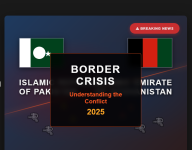What's Happening Between Pakistan and Afghanistan?
In October 2025, tensions between Pakistan and Afghanistan escalated dramatically when Pakistan launched airstrikes targeting Pakistani Taliban positions in multiple Afghan cities including Kabul, Khost, Jalalabad, and Paktika. The subsequent border clashes have resulted in dozens of casualties, marking one of the deadliest confrontations between the two former allies in recent years.

Root Causes of the Conflict
The current crisis stems from Pakistan's accusations that the Afghan Taliban government is providing safe haven to the Tehreek-e-Taliban Pakistan (TTP), a militant group responsible for numerous attacks within Pakistan. According to recent data, TTP activity in 2025 has already surpassed all of 2024, with the group conducting at least 600 attacks against Pakistani security forces in the past year alone.
If current trends continue, 2025 could become one of Pakistan's deadliest years, with last year already seeing at least 2,546 people killed in attacks.
Recent Military Escalation
Pakistan's military claims to have killed more than 200 Afghan fighters, while Afghanistan maintains it killed 58 Pakistani soldiers in cross-border fighting. The situation intensified after unprecedented Pakistani drone strikes killed two senior TTP members in Kabul, marking a dangerous escalation.
Border crossings have been closed, and armed Taliban security personnel have been deployed at key border points, further straining bilateral relations.
Regional Implications
The deteriorating relationship between these neighbors carries significant regional consequences. Both countries share a 2,600-kilometer porous border that has historically been difficult to control. The conflict threatens regional stability and complicates Afghanistan's already fragile humanitarian situation.
Pakistan has also initiated a massive repatriation program affecting millions of Afghan refugees, adding another layer of complexity to bilateral tensions.
What Experts Say
Security analysts warn that while full-scale war remains unlikely, the current trajectory is unsustainable. The conflict represents a dramatic reversal in relations between Pakistan and the Taliban, who were once close allies during Afghanistan's decades of war.
Looking Forward
The international community watches with concern as two nuclear-armed neighbors navigate this dangerous period. Diplomatic channels remain open, but recent violence has put peace efforts on hold. The coming months will be critical in determining whether both sides can de-escalate tensions or if the region faces a prolonged conflict with devastating humanitarian consequences.
For civilians on both sides of the border, the violence has already brought immense suffering, with families displaced and livelihoods destroyed in what many fear could become the new normal along one of Asia's most volatile borders.